
Dr. Min Kyu Kim presented about the theoretical underpinnings for the SMART project 🔗
April 1, 2024
Dr. Kim Kyu Kim, our director, presented the theory-driven development and research for SMART at today's AI-ALOE Foundational and Use-Inspired AI Meeting.
Dr. Kim began by outlining the project's aim of aiding learners in understanding key concepts. He elaborated on how theories such as Personalization, Community of Inquiry (COI), and ICAP (Interactive, Constructive, Active, Passive) have influenced SMART's design. Additionally, Dr. Kim shared our research questions and data collection methods within the SMART project. He also raised the question of having shareable instruments among the ALOE research teams and proposed the development of shareable theoretical frameworks to facilitate collaboration and research involving multiple AI tools. Dr. Kim led discussions on external threats and opportunities relevant to our work within the AI-ALOE as well.

Welcoming our visiting scholar: Sua Im! 🔗
March 31, 2024
We are pleased to welcome Sua Im to our lab as a visiting scholar!
Sua Im has joined our lab as a visiting scholar through the Outstanding Graduate Students’ Overseas Training Program (BK21 FOUR Project) sponsored by The National Research Foundation of Korea. Sua holds bachelor's degrees in French language and literature and in sports industry, as well as a master's degree in sports industry, all from Yonsei University, South Korea. She is currently advancing her Ph.D. studies at Yonsei. Her research focuses on various aspects of sports, serious leisure, and enhancing quality of life. Currently, she is exploring the intersection of AI-based programs and well-being among older adults within senior centers.

AI2 members presented the 3rd year research work at the AI ALOE retreat on March 7 - 8. 🔗
March 18, 2024
Dr. Min Kyu Kim, accompanied by two AI2 graduate associates, Jinho Kim and Yoojin Bae, participated in and delivered three presentations during the AI ALOE retreat at the CODA building at Georgia Tech on March 7th and 8th. This retreat marked the third year of ALOE activities, where researchers from multiple institutions shared their Year 3 studies, with a focus on theory, experimentation, and data analysis.
1. Theoretical Framework for the SMART Project
During the morning session of the first day, on March 7th, Dr. Kim proposed a hierarchical model of theories from a design research perspective to explain the theoretical framework for the SMART project. Specifically, he leveraged theories of mental models and self-determination theory as foundational principles supporting cognitive and motivational analysis in SMART design experiments. Additionally, he demonstrated how design guidelines derived from the general principles of the Community of Inquiry (COI) model and the Interactive-Constructive-Active-Passive (ICAP) framework were applied to SMART development.
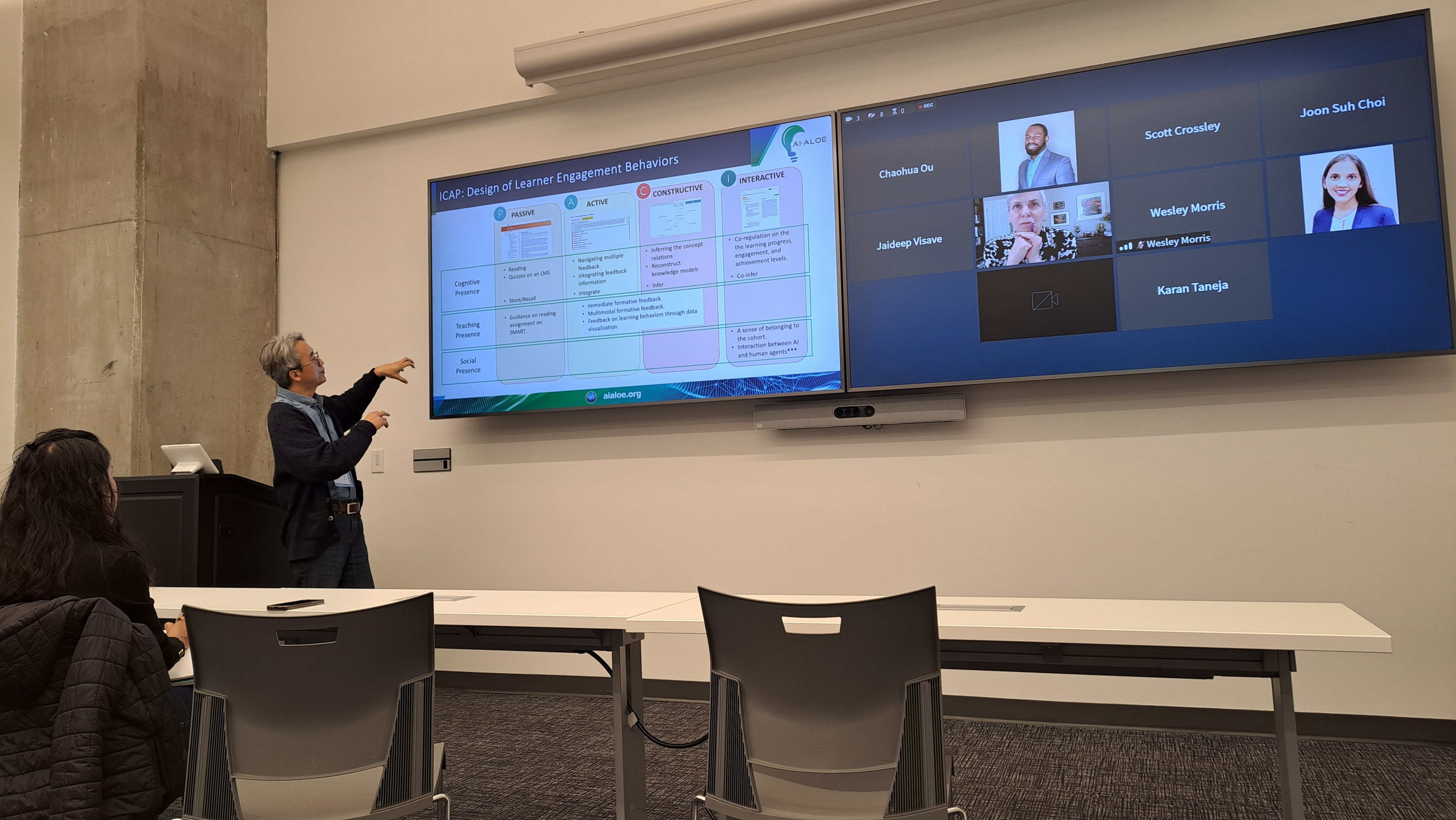
2. SMART Experiments
In the afternoon session on March 7th, Yoojin presented the SMART experiments conducted during Fall 23 and Spring 24 at English and Biology classes within the Technological College System of Georgia (TCSG) colleges. To assess different user experiences and levels of adaptation to the AI technology SMART, we conducted A/B experiments in the format of a quasi-experiment and randomized controlled trial, respectively. Yoojin demonstrated how AI2 researchers collaborated with instructors to design and implement SMART-integrated teaching and learning. Additionally, she shared her reflections on successful outcomes and failures for future consideration in AI-related experiment designs, including automated data collection at scale.
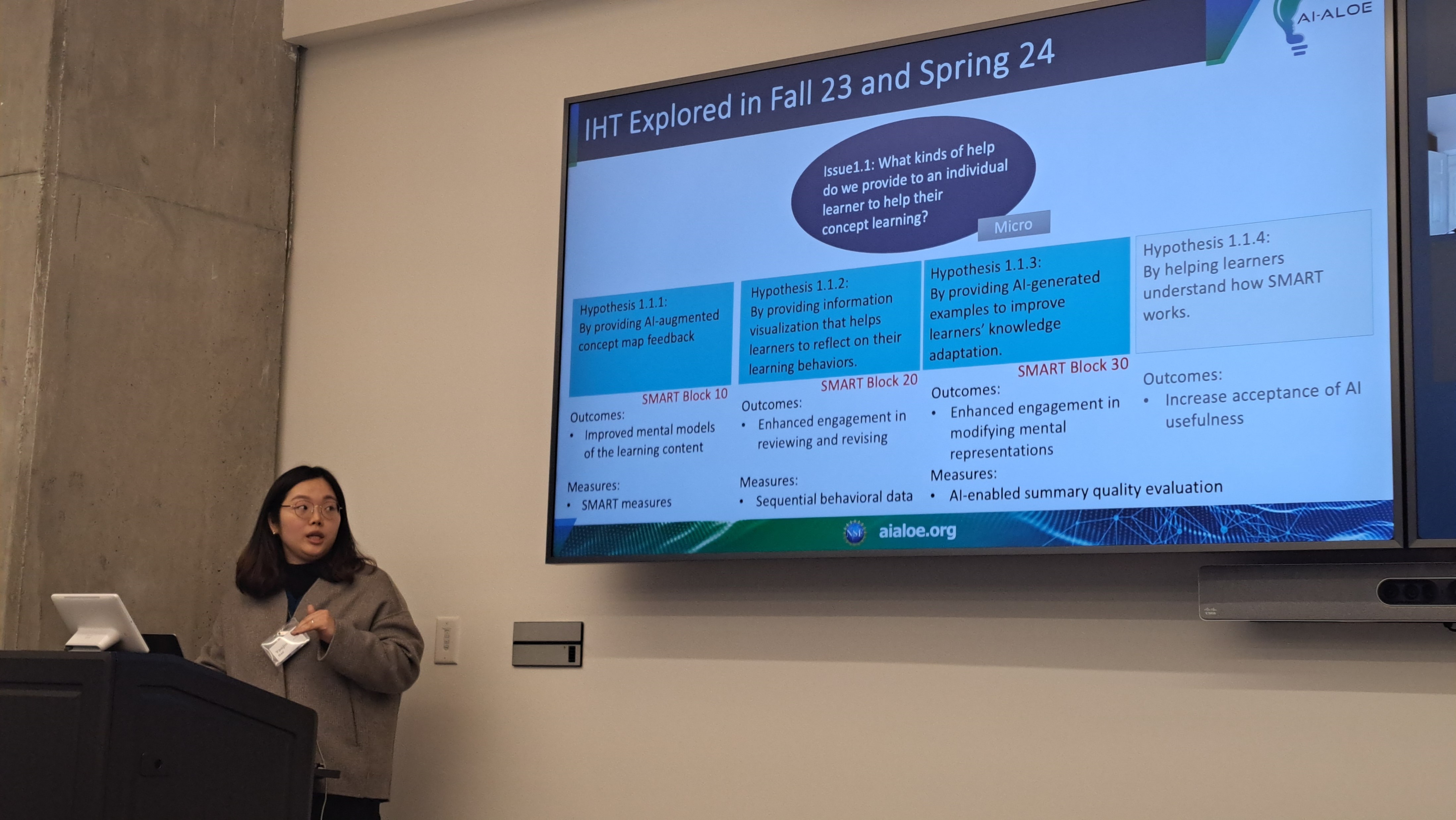
3. Summative Evaluation of the Three-Year of the SMART Deployment
On March 8th, Jinho presented our data analysis findings from the three-year deployment of SMART technology in two TCSG courses, English and Biology. As the AI ALOE team is currently in the midst of the project's third year, evaluating the effectiveness of SMART deployment for learner performance is crucial. To achieve this, we defined learning at both the micro and meso levels. Micro-level learning pertains to specific learning assignments within a unit, with summarization tasks on SMART considered as examples in this project. Meso-level learning, on the other hand, occurs across assignments throughout a course over a semester. Our assumptions were twofold: (a) learners' efforts in revising with SMART improve their conceptual understanding of the course materials (micro-level learning), and (b) this improved conceptual understanding influences higher performance in subsequent learning activities. To test these assumptions, linear mixed effects models were deployed, revealing a positive and significant impact across the courses.
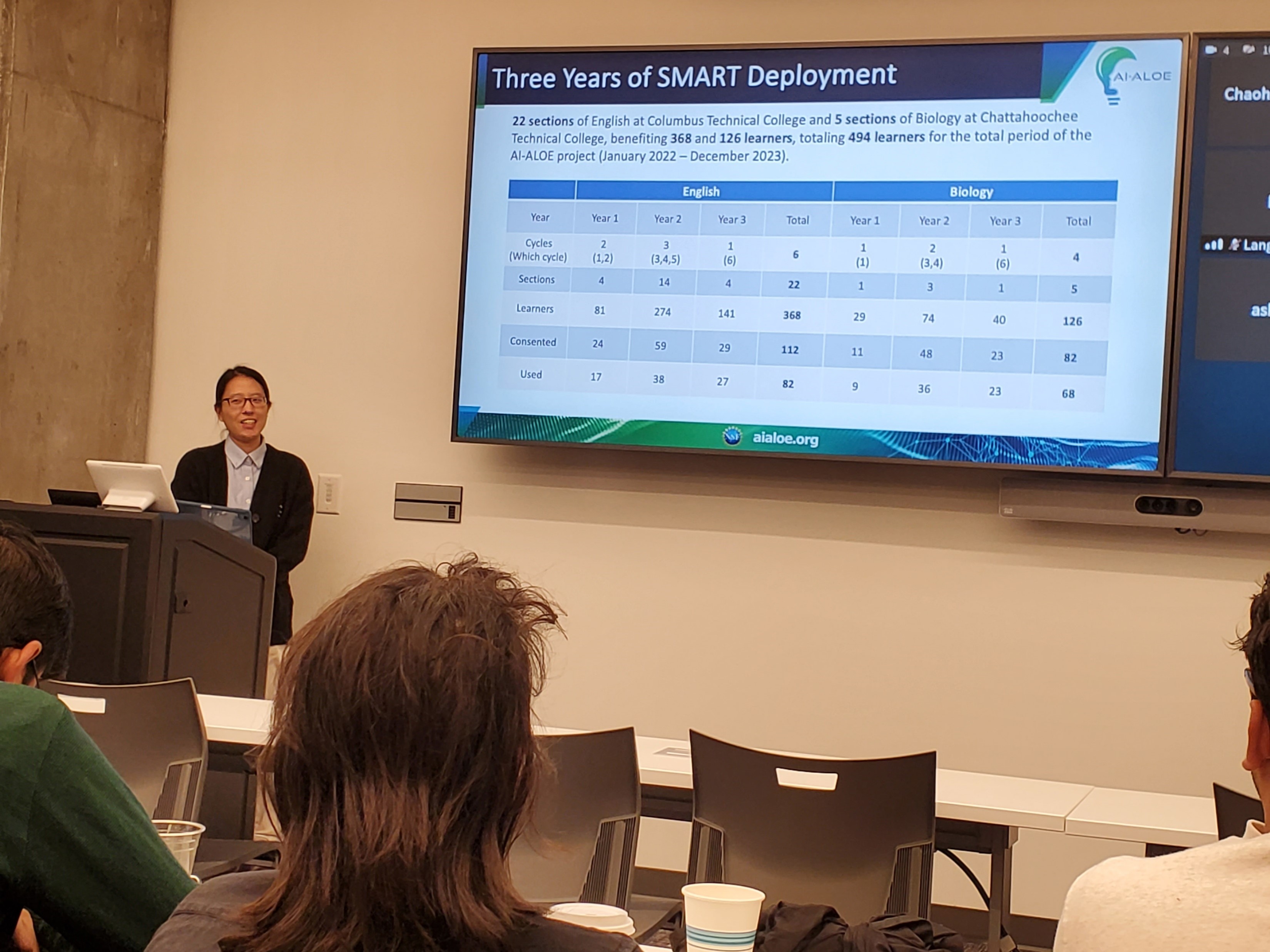

AI2RL Spring Feast 🔗
March 12, 2024
We had our highly anticipated Spring Feast during the spring break, gathering members of our lab together for a time of fun and enjoyable gathering. On March 12th, the members of our lab, including our two visiting scholars and three graduate associates, gathered at Dr. Kim's place at lunchtime to enjoy a midday filled with great food and pleasant company. We had a wonderful time with the delicious food Dr. Kim prepared for us, as well as tasty desserts and a choice of tea or coffee. The Spring Feast provided us with a much-needed opportunity to relax and unwind, setting the stage for a memorable and enjoyable break.

Invited Talk: Dr. Min Kyu Kim presented our learning measures and approach to machine teaching 🔗
February 26, 2024
Dr. Min Kyu Kim, our director, was invited to present at the NSF-ALOE Learning and Management Discussions on February 26th. His presentation was about the SMART project's learning measures and approach to machine teaching.
Dr. Kim discussed the various learning metrics utilized within the SMART project, starting from outlining the theory of change guiding our work, highlighting our research questions, and explaining the tools we use for data collection. Additionally, he addressed the successful strategies we've implemented, the challenges we face, and our efforts to improve data collection scalability. Dr. Kim also touched upon our team's approach to machine teaching, focusing on the use of generative AI for expert modeling. He briefly mentioned our upcoming pilot test plans and W.R.I.T.E. development as well.

Hyunkyu Han joins as a graduate research associate. 🔗
January 22, 2024
Let's welcom Hyunkyu, our new graduate research associate.
Hyunkyu joins our lab. She earned a Master's in Educational Technology from Yonsei University, South Korea and an undergrad in Elementary Education from Gongju National University of Education. Currently, she is an elementary school teacher in South Korea. Her research interests involve leveraging AI to create personalized learning environments that cater to the needs of learners and implementing AI-augmented active learning strategies.
Hyunkyu particularly focuses on the NSF-IUSE project in which she will lead the design of AI-augmented pre-classroom learning activities and strategies. The goal is to facilitate learners' smooth transition from pre-classroom to in-classroom learning and from self-paced to collaborative and hands-on learning in large-sized introductory physics courses.

Dr. Min Kyu Kim presented generative AI-based application development projects. 🔗
December 8, 2023
The director, Dr. Min Kyu Kim, presented generative AI-based application development projects at the NSF-ALOE Use-Inspired AI meeting (Dec. 4, 2023) and the first AI ALOE's Year 3 Executive Advisory Board Meeting (Dec. 8, 2023).
Dr. Kim introduced our two-track approach. We have continuously enhanced the current SMART (track 1), while concurrently developing a new application that fully harnesses generative AI LLMs (track 2). New features, empowered by generative AI, have been modularly developed, allowing some to be applied to SMART improvements. The W.R.I.T.E., Writing and Reasoning Intelligent Tutor for Education system, not only leverages SMART but also incorporates entirely different AI techniques, extending its applicability to various learning tasks. Our goal is to complete the initial WRITE development by the end of year 3.
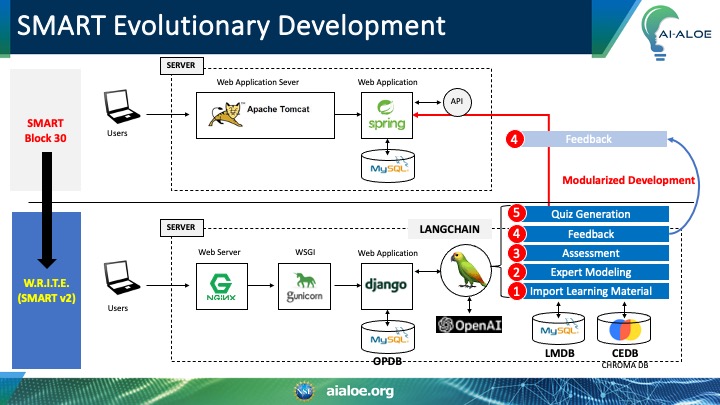

AI2 Lab's 2023 Thanksgiving Party at Dr. Kim's House 🔗
November 27, 2023
As part of our tradition, we had a great time at Dr. Kim's house during the 2023 Thanksgiving party! We celebrated our achievements throughout the year. During the lab feast event each semester, Dr. Kim showcased his culinary talents. This time, he prepared Korean-flavored roast beef along with several other dishes. Unfortunately, we realized that we hadn't taken a picture of the table. We couldn't wait to enjoy the delicious beef!
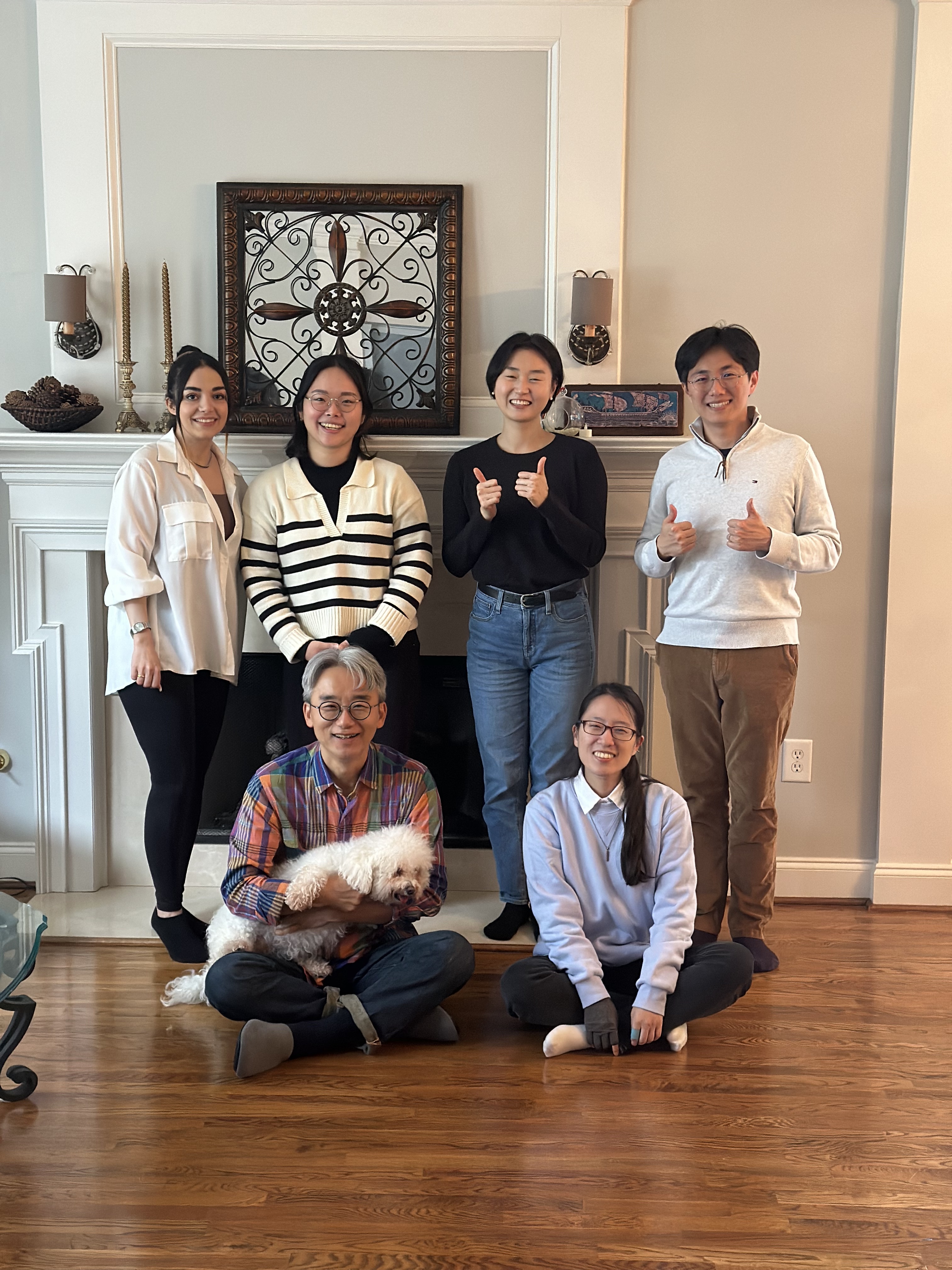

AI2 members presented papers at 2023 AECT conference, October 15, 2023 - October 19, 2023 🔗
October 30, 2023
At the 2023 Association for Educational Communication and Technology (AECT) convention, the AI2 members—Lia, Jinho, Yoojin, and our director, Dr. Kim—presented research papers from the NSF AI ALOE and NSF SaTC projects. Our graduate associates achieved remarkable success in their presentations and subsequent Q&A sessions. Through our projects, we demonstrated AI's potential to transform education by designing and implementing AI-augmented teaching and learning experiences, such as personalized learning in higher education and adult education. See the details of the papers below.
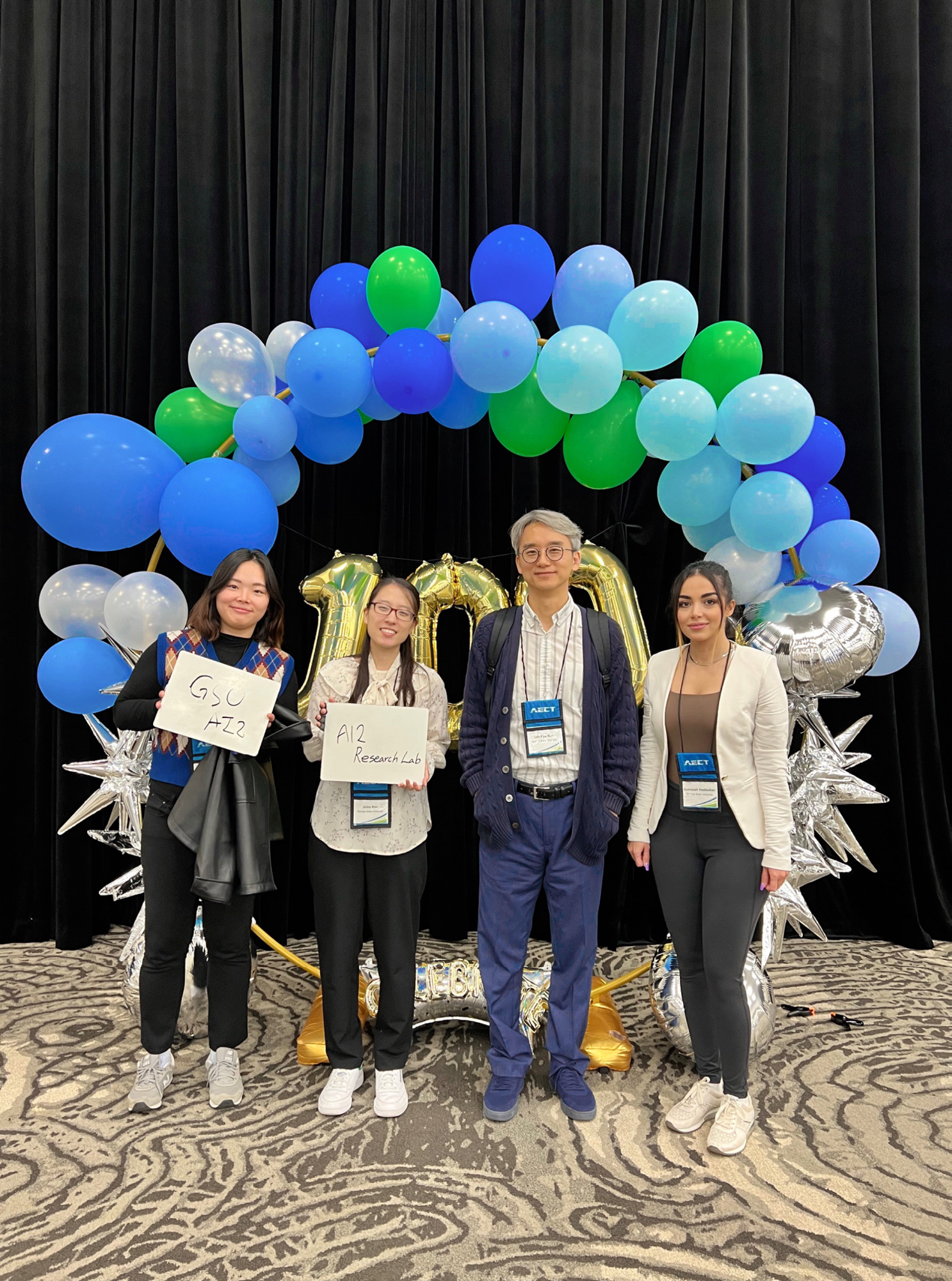
Bae, Y., Kim, J., Haddadian, G., Davis, A., & Kim, M. (October 2023). The impact of an AI-based educational tool, with a focus on technology acceptance and metacognitive awareness of adult learners. The 2023 Association for Educational Communications and Technology (AECT) Conference, Orlando, FL.
Abstract: This study examines whether AI-powered scaffolding during pre-classroom activities provides an advantage to students in an undergraduate-level Biology course. The study deployed Student Mental Model Analyzer for Research and Teaching (SMART), an AI-based formative assessment and feedback platform, to help students summarize reading materials. We observed the use of SMART had a positive effect on learners' perceived usefulness of technology, and the number of key concepts and density of summaries predicted learners' perceived technology usefulness.
Haddadian, G., Kim, J., Bae, Y., & Kim, M. (October 2023). A Comprehensive Model of AI Literacy from a Developmental Perspective. The 2023 Association for Educational Communications and Technology (AECT) Conference, Orlando, FL.
Abstract: We proposed a comprehensive model of AI literacy from a developmental perspective and demonstrate its potential as an analytic framework. Built upon the literature, we proposed a model that consists of cognitive and non-cognitive domains and supplemented our discussion with an empirical study which has used the model to analyze the AI literacy development in two college-level online courses. The empirical study demonstrates the potential of the proposed model to help research AI literacy development.
Haddadian, G., Panzade, P., Takabi, D., & Kim, M. (October 2023). A Design Study of Problem-Centered Instruction (PCI) for Private Artificial Intelligence (AI) Curriculum Development. The 2023 Association for Educational Communications and Technology (AECT) Conference, Orlando, FL.
Abstract: This design study examines a pilot test that implemented PCI for private AI curriculum in Computer Science (CS) education to identify the strengths and weaknesses of the curricular activities. The results indicated the feedback received from both the instructor and the students was generally positive. However, the study identified several areas of concern that indicate the need for further improvement. The study concludes by presenting the lessons learned and recommendations for enhancing the curriculum.
Kim, J., Bae, Y., Haddadian, G., Morris, W., Crossley, S., Holmes, L., Stravelakis, J., & Kim, M. (October 2023). AI-augmented summarization: Impact on online adult learners’ concept learning, discussion quality, and achievement. The 2023 Association for Educational Communications and Technology (AECT) Conference, Orlando, FL.
Abstract: This study aims to investigate how an AI-augmented summarization tool called the Student Mental Model Analyzer for Research and Teaching (SMART) impacts concept learning, discussion quality, and the achievement of adult learners. Findings from 21 participants in an undergraduate-level English course indicated that using SMART helped learners build a solid understanding of the readings and achieve higher end-of-year final scores. The results suggest the potential of using AI-augmented summarization tools to enhance learning outcomes.
Kim, J., Bae, Y., Haddadian, G., & Kim, M. (October 2023). Leveraging Machine Learning to Automatically Evaluate Cognitive Engagement in Asynchronous Online Discussions. The 2023 Association for Educational Communications and Technology (AECT) Conference, Orlando, FL.
Abstract: This study focuses on developing machine learning models to automatically evaluate cognitive engagement in asynchronous online discussions. To this end, the bidirectional encoder representations from transformers (BERT) was finetuned and trained, resulting in an accuracy of 72%. The developed model was utilized to evaluate a previously uncoded dataset, which was then analyzed in terms of learning clusters and trajectories. This research demonstrates the potential of using BERT for cognitive engagement assessment.

Six undergraduate interns from the Honor College's CS department have joined our lab 🔗
October 6, 2023
Please welcome our undergraduate interns: Akshat, Akshit, Jeshal, Jinash, Shanshan, and Solanlly. Our interns will work on developing a new version of SMART, fully enhanced by generative AI. They are exceptionally intelligent students from the Honors College. These smart interns will contribute to making SMART even smarter. Cheers!
Akshat Namdeo
Akshat is an honors college undergraduate student in the Department of Computer Sciences at Georgia State University. He is actively engaged in various lab projects, drawing upon his six-year immersion in the multifaceted domain of web development.
Akshit Calonia
Akshit is an honors college student pursuing a major in Computer Science at Georgia State University. He is currently undertaking an internship in the lab, focusing on harnessing the power of AI to develop smarter and more innovative applications.
Jeshal Patel
Jeshal is an honors college undergraduate student pursuing a major in Computer Science at GSU. He is interning at the lab, driven by his keen interest in integrating technology and AI into various aspects of educational problem-solving.
Jinash Rouniyar
Jinash is an honors college undergraduate student pursuing a major in Computer Science at GSU. He is actively engaged in various lab projects, leveraging his experience as a front-end developer at NSTEM and his proficiency in Java/Python programming languages.
Shanshan Wen
Shanshan is an undergraduate student in the Department of Computer Science at Georgia State University. She possesses a keen interest in Artificial Intelligence and full-stack development, with a strong desire to leverage these skills to enhance the online learning experience.
Solanlly Rijo Lake
Solanlly Rijo Lake is an Honors college student majoring in Computer Science with a concentration in Cybersecurity at Georgia State University. Her passion for learning and improving education by leveraging learning technologies in her home country, the Dominican Republic, led her to volunteer in the lab.